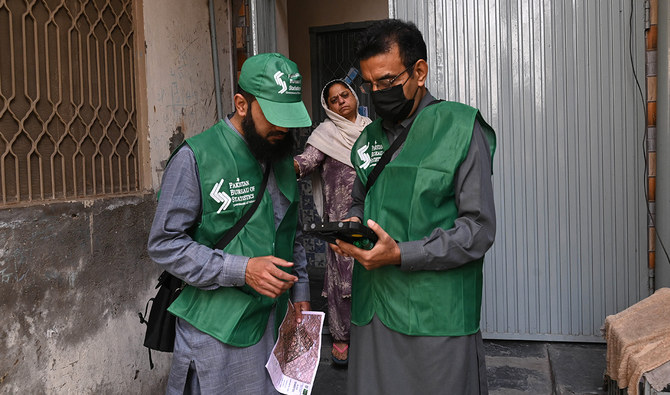ISLAMABAD: The Pakistani government remained hesitant on convening a meeting of the Council of Common Interests (CCI) on Thursday to seek approval of the results of the country's first digital census, with experts saying upcoming general elections could be delayed if the government remains in a limbo over the matter.
The Pakistan Bureau of Statistics (PBS) conducted the country's first digital census in May 2023. PBS forwarded the results to the CCI, a constitutional body comprising the prime minister and chief ministers of all provinces who decide important national matters with consensus.
The Prime Minister's Office and the chief statistician discussed the population census on Thursday but stopped short of convening the CCI meeting. The CCI only has the prerogative to approve census results. Once the census is approved and published, the law states that elections are to be held on the basis of the published census.
“As per the rules, members are required to be given a ten-day notice for the CCI’s meeting which has not been issued yet,” CCI's focalperson, Syed Mudassir Hussain Shah, told Arab News.
He said as chairman of the CCI, the prime minister is empowered to call the meeting while the council’s secretariat issues the agenda and facilitates the session. “We haven’t been officially communicated yet to release any meeting agenda,” he disclosed.
The five-year term of Pakistan's legislature will expire on August 12, with experts believing that if the census is approved days before the assemblies are dissolved, the move would delay general elections across the country.
Population censuses have a huge impact on elections in Pakistan, with census results serving as the basis of allocation of National Assembly seats among the four provinces of the country and Islamabad, according to Article 51(5) of the constitution.
The controversy began after Prime Minister Shehbaz Sharif said on August 1 that the upcoming elections would be held on population census 2023. Experts believe if the census results are approved, Pakistan's election regulator would require at least four months to complete the delimitation of constituencies, ultimately leading to a delay in the polls.
Pakistan's constitution stipulates polls should be held within 60 days after assemblies complete their tenure. However, if the government dissolves assemblies early, then elections would be held within 90 days.
According to the Election Commission of Pakistan (ECP), national elections would be contested on 266 National Assembly seats with 141 in Punjab, 61 in Sindh, 45 in Khyber Pakhtunkhwa, 16 in Balochistan, and three in Islamabad. This brings the total number of National Assembly seats to 336, out of which 60 seats are reserved for women and 10 for non-Muslims.
Former ECP secretary Kanwar Dilshad said if the CCI approves fresh census results, Pakistan's election regulator would be constitutionally bound to hold fresh delimitation of constituencies.
He added that the process could take four to six months.
“In that case, it is obvious that national elections would face a delay till the completion of the fresh delimitations across Pakistan,” Dilshad told Arab News, adding that the issue of allocating National Assembly seats could be deferred to the next parliament.
“The seats' allocation on the basis of fresh census data would require a constitutional amendment and that cannot be done in the absence of the National Assembly,” he said, adding that the new legislature after elections could take the matter up for discussion.
Dilshad said the CCI may constitute a commission to verify census results and develop a consensus among all stakeholders before giving its final approval. “It is a subjective matter, so let’s see how the CCI, if convened, handles it,” he said.
Rashid Chaudhry, deputy director of programs at the Free and Fair Election Network (FAFEN) in Islamabad, said an interesting situation regarding the redistribution of seats could develop after census results are published.
“It is mandatory as per the constitution to redistribute the number of the seats among all federating units after every population census through a constitutional amendment," Chaudhry told Arab News. "Which the current legislature cannot do.”
“Political parties will have to develop a consensus over census results and the timing of the next national elections, to avoid any controversy,” he added.
















